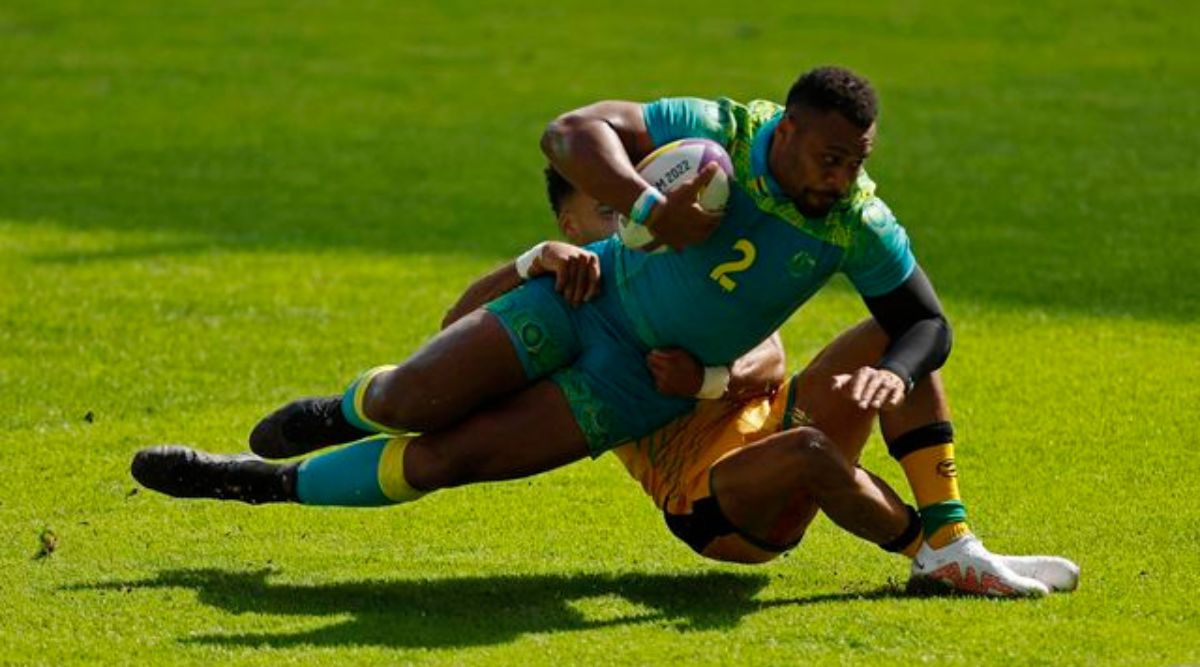 Samu Kerevi, who accidentally landed in Australia, is one of the country's best rugby players. (Reuters)
Samu Kerevi, who accidentally landed in Australia, is one of the country's best rugby players. (Reuters)An injured Samu Kerevi watched from the sidelines as his team, Australia, succumbed to a heavy defeat to New Zealand in the playoff for the Rugby 7s bronze medal on Sunday. In another world, and a different time, he could’ve been on the podium as a member of the famous All Blacks. Or for that matter, he could have taken home the gold with the all-conquering Fiji side.
Such is the life story of the 28-year-old rugby star.
Born in Fiji, he left the country when he was seven, saying goodbye to his family and escaping a life of crime. He moved to the Solomon Islands with his grandfather, who worked there for the Commonwealth. He, however, had to flee from there, too, following a coup d’état. A seven-year-old ‘Samu’ found himself on a New Zealand-bound military cargo plane, which facilitated his and his grandfather’s exit from the Pacific Islands. But then, as fate would have it, the plane got diverted to Australia and landed in Brisbane, where he was ultimately granted asylum.
Twelve years after accidentally landing in Australia, Kerevi is now regarded as one of the best rugby players in the world, and a Wallabies mainstay.
Subscriber Only Stories
He scored a first-half hat-trick in Australia’s opening win against Jamaica, and played an important role in ensuring Australia reached the medal rounds of the event. But an injury ruled him out of the bronze medal match and Australia lost 26-12 to New Zealand, the country Kerevi was originally headed to 12 years ago.
Escaping crime
Weeks before the Commonwealth Games began, he spoke about his determination to ‘rescue’ his family name. The Kerevis, back home in Fiji, had a notorious reputation. He recalled how his cousins and uncles got involved in a life of crime, talking about assaults and bank robberies.
“I had a pretty tough upbringing,” Kerevi told reporters in early July. “My mum had us pre-wedlock, pretty young, around 19 or 20 [years old]. It was a pretty difficult situation with my father’s family. They weren’t in the best area and there was a lot of criminal activity.”
Kerevi said his grandfather, who was a pastor, shielded him from a lot of what was going on at home and in the neighbourhood. But he could not entirely escape it, given his proximity. “A lot of my older cousins are in jail, my uncles have been in jail for 15 plus years. They’re all out now and they’ve changed their lives. I’ve got a cousin who has just come out from a 14-year stint… I speak to my cousins and they tell me about the things that used to go on. I couldn’t believe it. It’s like things out of a movie,” he was quoted as saying by the London Times.
Solomon Islands coup and flight to Australia
To get away from this, he hopped on to a flight to the Solomon Islands along with his grandfather. There were other considerations, too, for this move, he said – partly, as he was born out of wedlock and then, also because his parents were not able to afford to raise him and his two brothers.
“My older brother would go with my grandparents, I would go with another set of grandparents and my little brother stayed with my parents because financially they couldn’t support all three of us,” he said.
Moving to the Solomon Islands was an ‘adventure’ for the then seven-year-old. But it soon turned into a nightmare, and he found himself on another flight. “The (military) coup happened in 2000 so we had to flee Solomon Islands,” he said. “We were actually on the way to New Zealand but the plane stopped in Australia, I got citizenship — not citizenship but a bridging visa for asylum seekers — and we ended up staying here.”
He added: “It was a military cargo plane that picked us up. We were just sitting on the side of the plane. When we got to Australia they had everything waiting, clothes for us through the Salvation Army. I didn’t really know what was going on.”
Kerevi could ‘not speak even a word of English’ when he landed in Brisbane. Today, he has a reputation for being one of the most fearsome centres in world rugby. And as fate would have it, Kerevi made his international debut for Australia in the city back in 2016.
The Tokyo Olympian and World Cupper hopes that his exploits on the rugby field will give a positive spin to the ‘Kerevi’ name. “As a Fijian, your family name is really important and our name on my father’s side wasn’t very good back then,” he said. “Even though they all had different surnames, everyone knew them as Kerevi and that name wasn’t positive. The biggest part I take from playing footy is being able to tie in that name with something positive. For me, it’s really special.”
- The Indian Express website has been rated GREEN for its credibility and trustworthiness by Newsguard, a global service that rates news sources for their journalistic standards.

